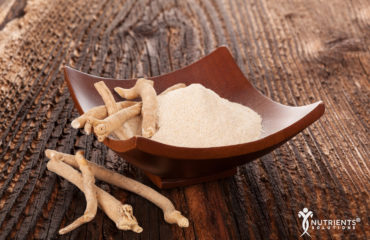Wellness Demystified: We Can Help You Discover Optimum Health
Top 7 Ways Vitamin B5 Boosts Beauty and Health

Vitamin B5, also called pantothenic acid, is one of the eight B vitamins, often called B-complex vitamins, which help the body produce energy and serve many functions key to health. Vitamin B5 helps synthesize red blood cells and stress hormones that help the body respond to stressors.
It’s easy to get enough vitamin B5 foods in your diet because it’s found in most foods in various amounts. In fact, the name “pantothenic acid” is rooted in the Greek word, “pantos,” which means “everywhere.” Deficiency can occur, however, in cases of malabsorption, and result in symptoms like chronic fatigue, depression, insomnia, irritability, stomach pain, and vomiting. Vitamin B5 in foods is also compromised by processing [2]. If you’re not sure whether you’re getting enough vitamin B5 from foods, it’s a good idea to supplement and ensure you’re reaping the health benefits of this essential nutrient.
1. Helps Reduce Cholesterol and Triglyceride Levels
Vitamin B5 is shown to lower levels of LDL (“bad”) cholesterol and raise levels of HDL (“good”) cholesterol. It also reduces triglycerides, which are a type of stored fat that contribute to your risk for heart disease [2]. To lower high cholesterol and triglyceride levels, high doses of vitamin B5 can be prescribed by a doctor. One 4-month study found that a daily 600 mg or 900 mg dose of vitamin B5 significantly improved lipid profiles in 120 people who were at low-to-moderate risk of heart disease, effectively reducing their risk. Researchers believe vitamin B5 works to this effect by metabolizing cholesterol [4].
2. Helps Heal Wounds and Slow Aging
Vitamin B5 plays a role in the health of your skin, particularly in protecting it from damage. Studies suggest it can treat the skin after radiation therapy, speed up the healing of cuts and wounds and even slow the progression of aging by reducing wrinkles and dark spots. By enhancing the multiplication of skin cells, it has a regeneration effect that strengthens the skin and promotes faster healing [5].
Vitamin B5 also promotes better skin hydration by stabilizing the skin’s barrier and increasing the amount of water it holds onto. As a result, you get softer skin with a fuller, younger appearance. While oral vitamin B5 supplements benefit your skin’s health, you can also use it topically for more immediate effects. Vitamin B5 is often used in anti-aging skin products and appears in skin creams as dl-panthenol or dexpanthenol. Vitamin B5 can also improve scar damage and reduce inflammation resulting from skin disorders such as eczema. For this reason, it’s included in several topical skin treatments [4].
3. Treats Acne
In a 2014 study published in Dermatology and Therapy, 41 adults with mild to moderate acne supplemented with either vitamin B5 or a placebo. At the beginning of the study and after 12 weeks, the number of inflammatory lesions on each participant were recorded. By the end of the study, those who took vitamin B5 had significantly fewer inflammatory lesions caused by acne, compared to the placebo group [6].
4. Helps with Rheumatoid Arthritis
Low vitamin B5 levels are linked to rheumatoid arthritis, possibly due to increased stress on the adrenal glands increasing the body’s demand for vitamin B5. In one study, 66 patients with rheumatoid arthritis were tested for vitamin B5. The results showed that those with the most severe symptoms had the lowest levels of vitamin B5 and that vitamin B5 deficiency is linked to the disease’s progression. A follow-up study on 18 patients found that 2,000 mg of vitamin B5 daily helped reduce pain, stiffness, and disability compared to a placebo [8]. Another study found that calcium with vitamin B5 also improved symptoms of rheumatoid arthritis [2].
5. Improves Athletic Performance and Recovery
Vitamin B5 helps athletes and anyone who works out by increases oxygen uptake and reducing the buildup of lactic acid. As a result, it improves both exercise performance and recovery time. Oxygen is the body’s most readily available way to produce energy during exercise. When there’s not enough oxygen to keep up with the intensity of your exercise, your muscles depend on a process called glycolysis. Glycolysis is the breakdown of glucose to produce usable energy, but it produces lactic acid as a waste product. Lactic acid creates the resulting burning sensation while using your muscles for exercise, as well as the soreness the day after. Vitamin B5 supplementation has been shown to prevent and clear up the buildup of lactic acid in your muscles so that you can exercise longer while recovering faster [7].
6. Vitamin B5 for Hair Growth
Vitamin B5 can help support healthy, thick hair and promote hair growth. In 2017, researchers working for Isfahan University of Medical Science in Iran conducted a study with vitamin B5 for publication in the Journal of Research in Pharmacy Practice. They evaluated the effects of vitamin B5 on women experiencing hair loss and found that it produced increases in hair thickness [9]. Vitamin B5 can, therefore, be useful for keeping hair thick and healthy.
7. Vitamin B5 and Cell Support
Vitamin B5 can help protect cells from damage and death resulting from exposure to ultraviolet light. A 2001 study in Free Radical Biology & Medicine analyzed the effects of vitamin B5 on white blood cells that experienced damage from ultraviolet. The authors of the study, who worked for the Polish Academy of Sciences, found that vitamin B5 protected against cell death and prevented the decrease of levels of the antioxidant glutathione, which occurs with ultraviolet damage [10]. Vitamin B5 can, therefore, protect the body’s cells from damage.
Sources of Vitamin B5
Adults are recommended to get at least 5 milligrams (mg) of vitamin B5 per day. Pregnant women need 6 mg while breastfeeding moms require 7 mg. Vitamin B5 is found in small amounts in most plant and animal-based foods, but some of the best sources include poultry, tuna, beef, organ meats, whole grains, avocados, and mushrooms. While most people get enough vitamin B5 from foods, not everyone can absorb it in adequate amounts [1]. For example, high caffeine intake, acid reflux medications, and high blood pressure medications interfere with vitamin B5 absorption [3]. Isolated vitamin B5 deficiency is rare; most people deficient in vitamin B5 are deficient in other B vitamins as well. Therefore, it’s recommended to take a B-complex vitamin to shore up deficiencies and prevent them [1].


© 2019 Nutrients Solutions, LLC. All rights reserved. Disclaimer: The information provided is for educational purposes only and does not constitute medical advice. Always seek the advice of your physician or qualified healthcare provider with any questions or concerns about your health. Check with your doctor before beginning any exercise program. Never disregard or delay seeking medical advice because of something you have heard or read in this article or the internet.












